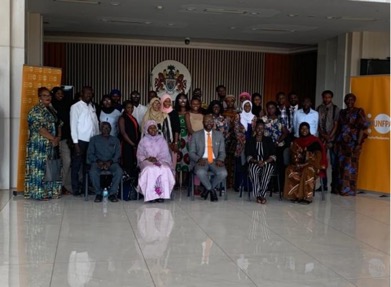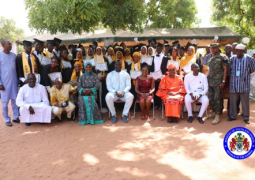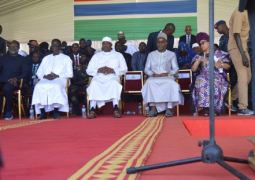
The interactive engagement held at Sir Dawda Kairaba Jawara Conference Center, Bijilo, also sought to provide adequate insight into the Country Programme Document of The Gambia government and UNFPA Country office with regard to key areas, accelerators, scope as well as the results of CPD, which will run from 2024 to 2028.
The forum also discussed UNFPA’s strategic shift as far as the CPD is concerned and to explore new partnership opportunities and the way forward for the successful implementation of the document.
At the event, Mariama Fanneh, executive director of National Populations Commission Secretariat, acknowledged that the UNFPA country programme has been in existence since the 70s, thus registering “tremendous success” in terms of various indicators.
“We have seen that from the Demographic Health Survey (DHS) 2013 -2019, maternal mortality has reduced from 433 for every 100,000 live births to 289 for every 100,000 live births,” she stated.
She also made reference to the increased uptake in family planning initiatives, saying there has been a significant improvement in curbing gender-based violence.
“Even though we have registered tremendous success when it comes to reduction in maternal mortality and total fertility rate, there exist regional disparities when it comes to total fertility rate, CPR and adolescents pregnancies,” she noted.
She commended UNFPA for their resolve in making sure that no one is left behind in their initiative and efforts at empowering adolescents.
For her part, Ndey Rose Sarr, UNFPA Country rep, thanked their implementing partners for collaboration in the preceding year, and added they look forward to a more fruitful collaboration with government and partners in the service of the country.
“CPD is really centered around adolescent youth and also looking at three important pillars,” she said. “The first one, would be to look at how to improve maternal health so that no woman dies while giving birth.”
This, she added, will also give access to women and young people to the use of contraceptives and family planning methods, while also looking at other negative gender and socio-cultural norms affecting the wellbeing of women and young girls.
The UNFPA Country rep also talked about adolescent and women empowerment initiative and to make sure women and youth have access to not only sexual and reproductive health services, but also to be empowered to participate effectively in political and social community initiatives.
This, she stated, would help in discouraging more youth taking on irregular migration route in search of greener pasture in the West.
She also dwelled on their programmes set in the coming years, affirming their resolve to work towards putting an end to preventable maternal death and to address the unmet need for family planning.
Giving an insight into the 9th CPD, which explores various areas, accelerators, scope as well as the results, Lamin Camara, assistant representative and head of programmes, UNFPA Country office, acknowledged that “it has been an exciting journey with partners in developing this ambitious document”.
This CPD being presented, he said, provides them not only with new opportunities, but also with new ways of fighting challenges more than ever before.
Camara also talked about FGM and other deep-rooted socio-cultural norms that need to be addressed in the country, saying women are still dying of preventable deaths.
Thus, he said, the CPD would give partners not only the opportunity to see how they could actually fit into the programmes, but more importantly, how the country programme links to other national and international strategic framework documents.
Camara acknowledged that The Gambia faces numerous challenges such as poverty, something he said has forced many youngsters resorting to taking the deadly migratory route to seek better life in the West.
He also talked about some gains made in ending preventable maternal deaths and improving the unmet need for family planning.
However, he reminded that FGM prevalence still stands around 73% and that there are regional disparities as high as 90% in some regions.
He thus called for innovative strategies to tackle the regional disparities in terms of eradicating FGM in the country.





